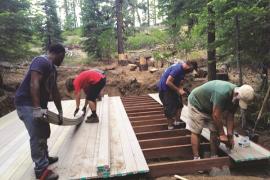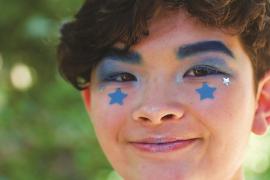Camp’s opening day excitement is palpable.
Sights and sounds elicit joy and anticipation from staff, counselors, and campers alike. Early arrivers wait in line for the camp gates to open. Campers run eagerly toward familiar faces, embrace, and catch up on 10 moons worth of news. A harried school year of deadlines and demanding extracurricular activities is replaced with fresh morning swims and breezy lake sails. Summer camp’s start offers the promise of freedom and relaxation among the pines.
However, campers’ social and emotional struggles don’t magically disappear when bunks are made and canoes are in the water. The New York Times reports that camps have seen a noticeable increase in mental health struggles among campers and counselors (Satow, 2021). Despite time passing since Covid lockdowns, emotional deficits from quarantine remain. To preserve the intentional camp experience and best support camper needs, leading camps are taking proactive steps to offer social science evidence-based mental and emotional health support and resources.
In 2022, Camp Kawanhee for Boys in Weld, Maine, witnessed the benefits of strategic, evidence-based clinical social work programs executed throughout the summer. Intentional social-emotional training prepared Kawanhee campers for emotional health management and staff for their own self-regulation. Once the training was practiced and the programs were implemented, more positive behavioral choices and fewer dysregulated interpersonal outbursts were observed compared to prior years.
Kawanhee’s higher overall emotional awareness created stronger interpersonal connections and a peaceful camp environment.
Two programs were created based on Marc Brackett’s book Permission to Feel (2019) and his idea to label emotions. In the first program, Maroon and Gray Scroll, documents were created in Camp Kawanhee colors. Each cabin proactively took time to think about how everyone wanted to feel at camp and posted those feelings on a piece of paper (a “scroll”) in each cabin’s common area. Shared feeling examples were “included” and “happy.”
Next, counselors, staff, and campers were invited to write down which behaviors best supported their desired feelings. Answers included, “Say hello to other campers when I walk in the cabin” (to feel included), and “Respect quiet time after lunch” (to feel calm).
Feedback from both campers and counselors indicated that the Maroon and Gray Scroll initiative helped foster a more constructive camp environment. Once needs and feelings were codified, campers saw greater commonality with others. Inclusion, empathy, and acceptance became the norm, creating a sense of emotional safety and, ultimately, greater connection. Post-program feedback confirmed that participants found the exercise useful, continued to contemplate and verbalize their emotional needs throughout the summer, and used the scrolls as a reference point if conflict arose.
Kawanhee’s second social-emotional program, the Meta Moment, was an extension of the Maroon and Gray Scroll activity. Meta Moment was designed for anyone in Camp Kawanhee to identify physical reactions to an environmental trigger. This awareness was then used to purposefully help each participant choose their reaction. Using a multilayered approach, participants then visualized how their “best selves” would act in a challenging situation. The goal of a Meta Moment was through increased body awareness to choose reactions (words and behavior) that were thoughtful, purposeful, and productive. Impulsive reactions turned into careful responses. Reliance on nonproductive words and actions decreased along with its associated insecurity and disconnection.
In Atomic Habits, James Clear writes, “You do not rise to the level of your goals. You fall to the level of your system” (Clear, 2018). By creating a social-emotional system proactively and systematically, Camp Kawanhee provided their campers and staff the best chance to truly rise to a relaxing, fun, and rejuvenating summer system. These skills are not always recognized at weekly campfires but can be practiced for a lifetime. And it can be these important life lessons that keep campers and their families returning for generations.
Photo courtesy of Alpengirl, Bozeman, MT.
References
- Brackett, M. (2019). Permission to feel. New York, NY: Celadon Books.
- Clear, J. (2018). Atomic habits. New York, NY: Avery Publications.
- Satow, J. (2021). Are The Kids Alright? The New York Times. nytimes.com/2021/08/12/nyregion/coronavirus-summer-camp-mental-health.html
Karen Mitchell, LCSW, is a family therapist and owner of KCM Therapy LLC. She uses evidence-based methods to assist teens and parents in navigating conflict. For more information, visit kcmtherapyllc.com.



